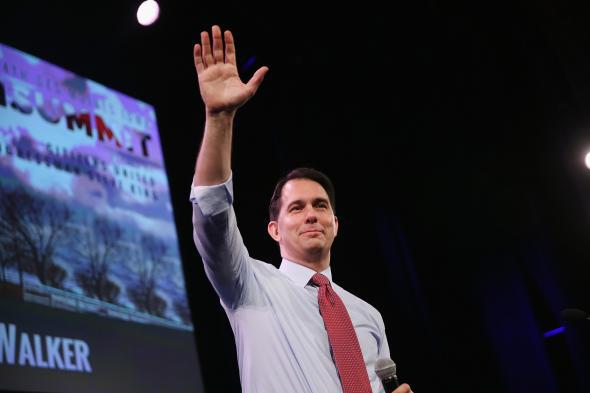Before the Iowa Freedom Summit on Saturday, one Republican activist summed up Gov. Scott Walker’s challenge this way: “He doesn’t make the flashbulbs go off.” But at the end of the marathon day of speeches before conservatives, the Wisconsin governor emerged as the leading light.
There were plenty of well-received speeches during the day from Sen. Ted Cruz and Ben Carson, but it was their home turf. The Freedom Summit, put on by Rep. Steve King and Citizens United, was a gathering of the base of the Republican base. But it was a bit of a SkyMall event—while there were lots of offerings it wasn’t clear if there was a place for the most exotic ones. Donald Trump, for example, may say he’s considering running for president, but it’s as hard to believe that he will be president as it is to understand the need for an Eye of the Dragon Mystical Safe Box.
Walker did the most to help himself politically, elevating his stature as a candidate who might achieve the elusive synthesis of pleasing the party base while also attracting a general election audience.
“Wow he’s good,” said Jane Hodoly, as Walker spoke. Later, in an interview, the Tea Party member from Ottumwa, Iowa said, “We need a warrior in the presidential office.” Walker, who retold the story of his battle with the unions (along with the death threats he faced) and what it took to win three elections in four years (including becoming the first governor to survive a recall) appealed to this desire. “If you are not afraid to go big and bold, you can actually get results,” Walker told the audience. Pat Scanlon, another Tea Party member, from Oskaloosa, Iowa said: “I wish he were our governor.”
Walker took the stage with a handheld microphone and walked across it as he spoke—making sure the audience got the point by saying he was causing trouble for the photographers trying to keep up with him. Stagecraft matters because while conservative hero Ronald Reagan perfected the use of the teleprompter, that speech aid is now seen as villainous because Obama relies on it so heavily. (The theory is that his trickery is laid bare when he has to speak extemporaneously.) Trump, whose role is to represent the id of a certain kind of anti-Obama voter, received big applause when he suggested that the teleprompter be banned.
Stagecraft also matters for Walker because in conversation with Iowa voters and organizers they mention again and again how they want to be excited by a candidate. When some have talked about Walker, they unfavorably compare him to Gov. Tim Pawlenty, another nice, neighborly Republican who was considered too tepid.
But as Walker spoke you could almost hear the political boxes being checked off. He thanked the conservative voters of Iowa, and the country, for supporting him in his fight against unions with money and prayers. This wasn’t only good form—it highlighted that he has a national fundraising base (i.e. he can go the distance) and that he is a man of faith (i.e. he’s just like you). Perhaps the best moment was when Walker made an analogy about taxes by talking about buying a sweater at a discount at Kohl’s department store. He talked at length about cobbling together so many coupons and store rewards until “the next thing you know they are paying me to buy that shirt!”
As an analogy it was confusing, but that wasn’t the point. The message was: I’m one of you. For a party competing over how to talk to middle-class voters while fashioning a response to President Obama’s appeal to them, this wasn’t a bad way to connect with voters who often care most about whether a candidate understands their lives.
The best any candidate can hope for at an event that appeals to such a narrow but influential audience is if the activists leave the hall talking about you. Still, the candidates don’t want to say anything to the faithful that turns off the broader class of voters. Essentially, they are aiming to do the opposite of what Sarah Palin does.
If Walker offered a strong showing, Christie helped himself by just showing up. Several in the audience said the New Jersey governor was too moderate to be worthy even of their consideration, but for Christie the goal isn’t winning over the hall; he is just trying not to stir up enmity the way Jeb Bush and Mitt Romney do. Throughout the day Romney and Bush were poked and lampooned by various speakers. There were many specific critiques, but former Speaker of the New Hampshire House Bill O’Brien captured the overriding political feeling when he said: “We lose when we nominate RINOs.”
Winning the approval of conservatives—or at least avoiding overt hostility—is just one of the many tests a candidate must pass. They’ve also got to raise money, develop a general election message, and hire staff. Jeb Bush wasn’t in Iowa, but in San Francisco, where he gave his first major speech since declaring in mid-December that he’s seriously considering a presidential run. He talked about the “academic and political hacks” in Washington with “hard-core ideology,” saying, “they’re basically Maytag repairmen … Nothing gets done. It is time to challenge every aspect of how government works—how it taxes, how it regulates, how it spends—to open up economic opportunity for all.”
His words were an implicit critique of the audience that had gathered in Iowa, which wants more ideological fealty from its Washington representatives. As the Republican Party searches for a synthesis candidate, we saw three different examples from GOP governors last week: Walker in sync, Christie in cooperative tension, and Bush in confrontation.
